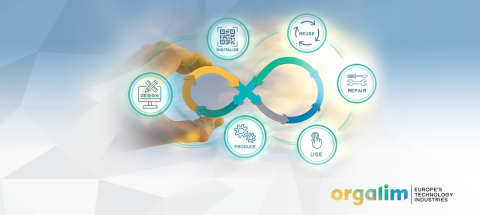Orgalim welcomes European Parliament vote on the Ecodesign for Sustainable Products Regulation
12 July 2023

Orgalim welcomes today’s plenary vote in the European Parliament in favour of the proposed Ecodesign for Sustainable Products Regulation (ESPR), a big step forward for the circular economy and sustainable products in Europe.
Our industries previously welcomed the Commission proposal for an Ecodesign for Sustainable Products Regulation as a key measure to further optimise the way resources are used throughout the economy and society as well as bringing new business opportunities – a win-win for the environment and the economy, making the most of new digital solutions.
Europe’s technology industries strongly support in particular the following points underlined in the report from the European Parliament:
-
Competitiveness of economic actors in particular of European SMEs shall be ensured.
-
Requirements harmonised at EU level to secure the functioning of the internal market.
-
The protection of confidential business information shall be safeguarded.
-
Consistency should be ensured between this Regulation and requirements set in, or pursuant to, other Union legislation, and duplication of information and reporting shall be avoided.
-
All requirements set by the Regulation must be implemented with sufficient transition times to minimise market distortions.
-
A transparent and inclusive Ecodesign Forum.
-
Appropriate instruments of financial and educational support for businesses, especially for SMEs, shall be ensured.
-
The information to be included in the Digital Product Passport (DPP) should be carefully examined on a case-by-case basis when preparing product-specific rules, taking into consideration the protection of confidential business information. DPPs shall be fully interoperable with existing product databases and industry solutions, where appropriate.
We regret that the European Parliament did not improve the definition of Substances of Concern (SoC) to target only substances relevant for circularity. To provide legal clarity and avoid double regulation, it is essential that information requirements on chemicals are aligned under ESPR and REACH regulation. We urge policymakers to improve this SoC definition in the future.
Orgalim looks forward to continuing to work with European institutions and all stakeholders on the next steps towards finalising the Ecodesign for Sustainable Products Regulation and building a thriving circular economy.

LATEST NEWS
How can we create a dynamic, competitive European high-tech manufacturing base?
Orgalim's key recommendations offer policymake...
